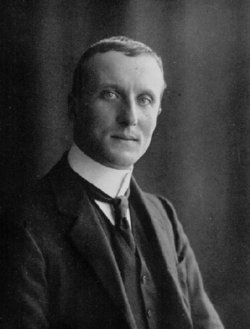|
|
Constantin Carathéodory (Greek: Κωνσταντίνος Καραθεοδωρή) (September 13, 1873 – February 2, 1950) was a Greek mathematician of the Modern Era. He made significant contributions to the theory of functions of a real variable, the calculus of variations, and measure theory. His work also includes important results in conformal representations and in the theory of boundary correspondence.
Constantin Carathéodory was born in Berlin from Greek parents and grew up in Brussels, where his father served as the Ottoman ambassador to Belgium. The Carathéodory family was well-established and respected in Constantinople, and its members held many important governmental positions.Carathéodory studied engineering in Belgium, where he was considered a charismatic and brilliant student. In 1900 he entered the University of Berlin. In the years 1902-1904 he completed his graduate studies in the University of Göttingen under the supervision of Hermann Minkowski. During the years 1909-1920 he held various lecturing positions in Hannover, Breslau, Göttingen and Berlin.
In 1920 Carathéodory accepted a post in the University of Smyrna, invited by Prime Minister Eleftherios Venizelos. He took a major part in establishing the institution, but his efforts ended in 1922 when the Greek population left the city after the Greco-Turkish War.
Having been forced to move to Athens, Carathéodory brought along with him some of the university library, thus saving it from destruction. He stayed at Athens and taught at the university and technical school until 1924.
In 1924 Carathéodory was appointed professor of mathematics at the University of Munich, and he held this position until his death in 1950.
1926 he gave a strict and general proof, that no system of lenses and mirrors can avoid Aberration, except for the trivial case of plane mirrors.
Among other accomplishments, one should mention Carathéodory's remarkable talent for languages. In addition to Greek and French as native languages, he published most of his works in German and also fluently spoke English, Italian and Turkish. Such an impressive linguistic arsenal enabled him to communicate and exchange ideas directly with other mathematicians during his numerous travels, and greatly extend his fields of knowledge.
He is credited with the theories of outer measure, and prime ends, amongst other mathematical results.
See also
External links
el:Κωνσταντίνος Καραθεοδωρή he:קונסטנטין קרתיאודורי pl:Constantin Carathéodory sl:Constantin Carathéodory

